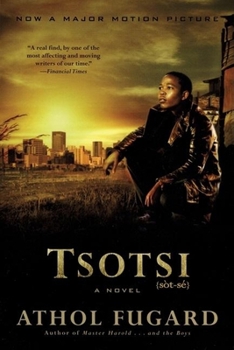Tsotsi
Select Format
Select Condition 
Book Overview
Athol Fugard is renowned for his relentless explorations of personal and political survival in apartheid South Africa -- which include his now classic plays Master Harold and the Boys and The Blood Knot. Fugard has written a single novel, Tsotsi, which director Gavin Hood has made into a feature film that is South Africa's official entry for the 2006 Academy Awards. Set amid the sprawling Johannesburg township of Soweto, where survival is the primary objective, Tsotsi traces six days in the life of a ruthless young gang leader. When we meet Tsotsi, he is a man without a name (tsotsi is Afrikaans for hoodlum) who has repressed his past and now exists only to stage and execute vicious crimes. When he inadvertently kidnaps a baby, Tsotsi is confronted with memories of his own painful childhood, and this angry young man begins to rediscover his own humanity, dignity, and capacity to love.
Format:Paperback
Language:English
ISBN:0802142680
ISBN13:9780802142689
Release Date:January 2006
Publisher:Grove Press
Length:256 Pages
Weight:0.70 lbs.
Dimensions:0.7" x 5.6" x 8.2"
Related Subjects
Contemporary Fiction Literary Literature & Fiction Psychological Thrillers ThrillersCustomer Reviews
5 ratings
Good read
Published by Thriftbooks.com User , 16 years ago
If you want to get an idea of how it is to be in africa this is a great book.
Heartbreaking
Published by Thriftbooks.com User , 17 years ago
Athol Fugard is a brilliant writer and commented on the evils of apartheid for many years through his plays. This novel is heart-breaking as it describes the terror of a child left alone to fend for himself in a large city in Africa with no welfare services. The child has no choice but to become part of a gang of other street kids and they survive only by criminal behaviour. This story is dark and tragic and very well told. The saddest thing is that this is the story of many young criminals throughout the world and that our society allows this to happen over and over again.
Fantastic
Published by Thriftbooks.com User , 18 years ago
Gripping and contemporary (despite when it was penned) plot. Meticulous yet poetic writing. If there were a rating higher than "five," this novel would have it.
Pas, Kaffir!
Published by Thriftbooks.com User , 18 years ago
In a razzia by the South-African police looking for illegal immigrants, the main character of this book, a 10 year old, looses 'the big, gentle, warm, protective mother behind whom he had hidden and escaped from the whole world of a child's fear.' From now on, he stays defenseless in a strange labyrinth of laws, 'loneliness, being the only person in the world ... He learnt the lesson of hunger ... He learnt to watch for the weakness of sympathy or compassion for others weaker than yourself, like discovering how never to feel the pain you inflicted. He had no use for memories ... There was only the present, that continuous moment carrying him forward without question of regret.' He becomes a tsotsi, a wild, brutally killing animal, always looking around for easy targets (the painted and the cripple): 'There was no conflict. It wasn't a question of should I, or shouldn't I. He was resigned to the inevitable, watching it unfold as doctors would the last stages of a disease in a patient who is beyond help.' But one day, his wild mind is shaken when he meets a woman with a child. He is confronted with the moral problem of 'decency' as one of his gang members said. Athol Fugard draws a profoundly moving and dramatic picture of a child gang in a dark and life threatening city. The treatment of the variations on the theme of absence - mother, father, friends, moral conscience, life - is not less than masterful. This book is a real masterpiece.
A profoundly moving and achingly beautiful masterpiece
Published by Thriftbooks.com User , 25 years ago
Upon finishing this book I could not help but wonder if there has ever been a work of literature which could transcend the beauty and depth of perception and compassion conveyed in Fugard's "Tsotsi." If anyone reading this knows of such a work, please do feel free to e-mail me so that I can experience what will be the height of greatness.





